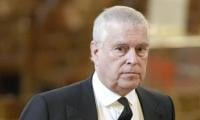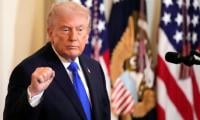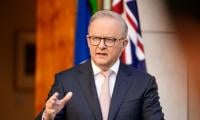The hacking effort
There’s another way in which the internet has become a tool of censorship, albeit unintentionally. In 2014, Facebook changed its algorithm so that content which the platform detects that an individual user most likes shows up on our respective newsfeeds. As a result, political content that doesn’t fit with a person’s pre-existing beliefs is censored.
As Buzzfeed’s Ryan Broderick explains, “algorithms identify that a user likes one particular page and suggest others, creating an echo-chamber effect that can lead to some pretty scary places.” Broderick says this has helped radicalise Facebook users across the United States, Britain, France, Russia, and Australia, bolstering support for far-right candidates and causes.
More diabolically, The New York Times reported recently that Facebook is working on a tool to censor posts by Chinese citizens, so that it can re-enter the Chinese market, where the government currently blocks access to the site - a practice the social network has already used in Russia, Turkey, and Pakistan.
The small possibility that the US election was hacked - following attempts to hack voting infrastructure in Ukraine, Norway, and the Netherlands - would, if true, be the ultimate form of cyber censorship. We do know that hackers breached voter registration systems in at least two states and targeted more than 20 states.
How can we fix this? First, the US government must strike back at the state-backed hackers targeting opinion leaders and Democratic operatives. It’s wholly unacceptable for a foreign government to meddle in an election, just as it’s intolerable for an outside state to attempt to attack the watchdogs of democracy. Although a counter-cyberattack is warranted, the US should also consider other options, such as sanctions and publicly exposing, and freezing the assets of, the state sponsors of these attacks. This response needs to begin under President Obama, but it must continue under President Trump.
Journalists and media organisations around the globe can also work together to identify and expose the hackers. This approach was recently used by the German newspaper, Sueddeutsche Zeitung, when it brought together reporters from 107 media outlets around the globe, with the help of the International Consortium of Investigative Journalists, to analyse 11.5 million documents exposing how the world’s wealthiest people shield their money from taxes and commit other financial crimes.
Third, Facebook must alter its algorithms. Today. Although the current debate in the media is largely focused on how Facebook can fight fake news, combating censorship must be an equal and urgent priority. The free flow of information and the debate it generates is essential to democracy.
Finally, the US needs a publicly funded recount of paper ballots and examination of electronic voting machines in several states. It shouldn’t be up to Green Party supporters or the Clinton campaign to pay for it. The US government also needs to better protect voting systems for 2020.
We need to take the internet back, not as liberals responding to these attacks, but as citizens of every creed demanding that cyberspace not be censored.
The article has been excerpted from: ‘We need to resist censorship of cyberspace’.
Courtesy: Aljazeera.com
-
 British Royals ‘not Appreciated’ In Modern World, Says Author
British Royals ‘not Appreciated’ In Modern World, Says Author -
 Applebees Closures Expand With Glenville Restaurant Closing For Good After 10 Years
Applebees Closures Expand With Glenville Restaurant Closing For Good After 10 Years -
 Louvre Director Resigns After Historic Jewelry Heist Exposed Security Flaws
Louvre Director Resigns After Historic Jewelry Heist Exposed Security Flaws -
 Mike Johnson Presents George Washington's Gavel For First Time At State Of Union
Mike Johnson Presents George Washington's Gavel For First Time At State Of Union -
 Mexico Travel Warning: What You Need To Know As Airlines Resume Flights To Mexican Cities
Mexico Travel Warning: What You Need To Know As Airlines Resume Flights To Mexican Cities -
 Jamie Lee Curtis Mourns Death Of Ex-boyfriend Robert Carradine: 'He Was My First Crush'
Jamie Lee Curtis Mourns Death Of Ex-boyfriend Robert Carradine: 'He Was My First Crush' -
 Andrew Mountbatten Windsor Worried About Wrong Things In New Home
Andrew Mountbatten Windsor Worried About Wrong Things In New Home -
 Jack Hughes Speaks Out As Jake Guentzel, And Team USA Push Back On State Of The Union Backlash
Jack Hughes Speaks Out As Jake Guentzel, And Team USA Push Back On State Of The Union Backlash -
 Shamed Andrew Got ‘massages’ Over Royal Money, Says Victim
Shamed Andrew Got ‘massages’ Over Royal Money, Says Victim -
 Justin Trudeau's Son Breaks Silence On Katy Perry Romance
Justin Trudeau's Son Breaks Silence On Katy Perry Romance -
 Zachery Ty Bryan Sentenced To 16 Months In Jail After Pleading Guilty To DUI
Zachery Ty Bryan Sentenced To 16 Months In Jail After Pleading Guilty To DUI -
 'Your Friends & Neighbors' Star Jon Hamm Reacts To His Viral Dancing Meme
'Your Friends & Neighbors' Star Jon Hamm Reacts To His Viral Dancing Meme -
 Anthropic Unveils New AI Tools Weeks After Legal Plug-in Rattled Markets
Anthropic Unveils New AI Tools Weeks After Legal Plug-in Rattled Markets -
 Osheaga 2026 Lineup Revealed With Tate McRae, Lorde And Twenty One Pilots
Osheaga 2026 Lineup Revealed With Tate McRae, Lorde And Twenty One Pilots -
 Prince Harry, Meghan Markle Markle Training Beatrice, Eugenie For Tell-all
Prince Harry, Meghan Markle Markle Training Beatrice, Eugenie For Tell-all -
 Chris Hemsworth Reveals Real Reason He Quit Hollywood Life For Melbourne
Chris Hemsworth Reveals Real Reason He Quit Hollywood Life For Melbourne



